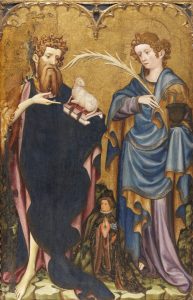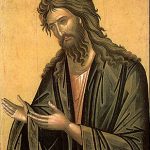Advent 2 – the Baptiser
1.
Today we mark the birth of St John the Baptist.
This is the record of John, when the Jews sent priests and Levites from Jerusalem to ask him, Who art thou? And he confessed and denied not, and said plainly, I am not the Christ.
I am sure many of you could hear the musical setting to those words as I read them—the seventeenth century setting by Orlando Gibbons.
Who would have thought that such a strange and wiry man as John the Baptist, could inspire such art. Music springs eternal.
His diet, of course, was severe–grasshoppers and honey.
And he wrapped himself in a camel skin, tied at the waist, too. That is more important than people usually realise, for it is just how Elijah had dressed. Like Elijah, John called Israel back—back to its unity in God, and away from idols.
Rend your heart! The reign of God is near!
Or, as it usually is, repent, the kingdom of God is near!
John prepared a place for God’s appearing: and that place was none other than the human heart. John was a prophet of heart-change. The word repentance, metanoia, means heart-change: it is going deeply into the heart, into one’s pain and grief and shame, and opening up to God. This is just what the pilgrims did who came out to John at the edge of the river Jordan: they made their confession, and John plunged them into the salty waters.
And this was for them a release. They were released from the net of self-accusation: for all accusation is, ultimately, self-accusation. So I think of John as one who cleared the ground of the heart, washing away thorns and thistles and bruises in the healing waters.
That way the soil could become fertile again.
2.
 Yet John always points away from himself to another baptiser. A Stronger One will come, who will pour out not water, but the Spirit of God.
Yet John always points away from himself to another baptiser. A Stronger One will come, who will pour out not water, but the Spirit of God.
The prophet Joel imagines it like this: “Then … I will pour out my spirit on all flesh; your sons and your daughters shall prophesy, your old men shall dream dreams, and your young men shall see visions. Even on the male and female slaves, in those days, I will pour out my spirit.”
A Stronger One will come, who not only prepares the ground of the heart, but who brings forth new creation. He will not only turn the soil, but will bring forth new growth.
And this is who Jesus was understood to be—the Second Baptiser, the bringer of new creation.
So Jesus says boldly to John’s disciples “The blind receive their sight the lame walk the lepers are cleansed, the deaf hear, the dead are raised and the poor have good news brought to them!” (Matthew, quoting Isa.61) We don’t have to take this literally: but it is an exuberant statement of the new life that was taking hold. Jesus inaugurates a new situation.
Jesus not only forgives sins, but changes the measuring-line altogether: now the faithful poor will be blessed—the humble, the reconcilers, the accused will be blessed. Jesus pours out the Spirit of God on those who serve the least of these, his brothers and sisters.
There comes one mightier than I, and I am unworthy to loose the thong of his sandals.
3.
So how can we follow in the steps of the first baptiser and of the second?
How can we become baptisers? Well it isn’t actually by splashing water around, although at my present parish there is a couple who baptised their own children without a priest, far out of town, with a garden hose. It was a valid baptism!
But baptism is more than just an outward sign.
We are, I believe, called to share in the Baptist’s ministry of forgiveness: we are to help unbind people from the snares of self-accusation—not indeed that we will trivialise whatever might be weighing on their conscience, but will be try to show them that, for all that, their goodness still shines through. God still shines through, and can make a dwelling place even in them, even them.
And we are called to share in Jesus’ ministry of new creation—to strengthen and empower the weak, to help others to see that they too can know the joy of life: they can be part of it! And even dare to reimagine society.
Rend your heart! The reign of God is near!
Our ministry is heart-change.
Or, as the famous hymn would have it:
On Jordan’s bank the baptist’s cry | announces that the Lord is nigh. |Awake and harken, for he brings | Glad tidings from the King of kings!
Stretch forth your hand, our health restore, | and make us rise to fall no more. | O let your face upon us shine | and fill the world with love divine.
Amen.

